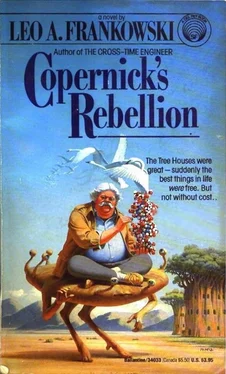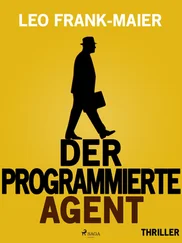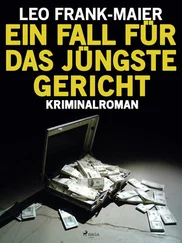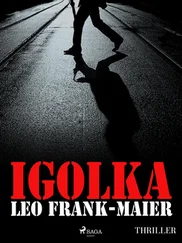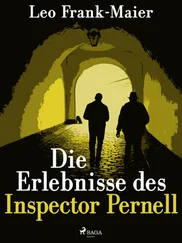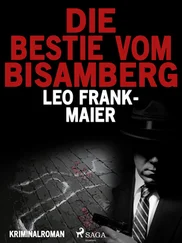Nonetheless, when General Hastings entered the valley with a half pound of plastic explosives taped to his right ankle, Chikuto was judged to be the one most competent to disarm the bomb.
It was two o’clock in the morning.
Screened by two dozen of his brothers, who had cleared the area of bystanders, Chikuto crept up to the park bench that served as Hastings’ bed. Flat on his back, Hastings snored loudly.
Hastings’ left ankle was resting on top of his right, and, working in almost complete darkness, Chikuto gently lifted it off the bomb. Hastings snorted but remained asleep.
Working carefully by touch, Chikuto removed the blasting cap and scooped the old, hot, and sticky C-4 out of its package. Since the manuals had said that plastique resembled gray modeling clay, he had brought a half pound of clay with him. His fingers were thick with C-4 as he gently pushed the kneaded clay into the package.
All told, between the C-4 reintroduced into the package from Chikuto’s fingers and that which had remained stuck to the package, the “disarmed” bomb contained more than an ounce of plastique.
Chikuto’s last mistake was to replace the blasting cap. He hadn’t the slightest concept of what the cap alone could do.
Liebchen sat tiny in the huge living room, biting her lip, tears dropping from her chin, shivering as with fever. They’d throw her out, of course. They wouldn’t let anyone as wicked and evil as she was raise human children or even her own babies. They’d make her work in a restaurant and there’d be a lot of people, but none of them would love her. Even her sisters and Lady Mona wouldn’t want to see her again. Maybe they’d make her work with Mole in the tunnels, and Mole would hate her and it would be terrible. Maybe she should just die. Maybe that would be best.
Guibedo came in, his face expressionless, and Liebchen’s heart almost stopped. But when he saw her quivering, he softened and sat down beside her.
“It’s okay, little one.” Guibedo put a thick arm around her and held her to him like a father consoling his daughter. “Everything is going to be all right.”
Dirk came in and sat quietly at their feet, eager to be a part of their being together.
Guibedo said, “I guess maybe this is my fault, because I don’t explain what is happening, because I make easy things look hard and hard things look easy. You two, you see me or Heiny work with gene sequences and computer simulations for two or three months, and then spend ten or twenty hours at a microscalpel and presto! Life!
“What you don’t see is the four billion years that had to go by before I could sit at that chair. Four billion years of tiny random modifications, with only one in ten billion worth preserving. Ten billion organisms doomed to an early death so that one could be a little bit faster or stronger or smarter or more efficient. And when that one finally came along, it spread and multiplied at the expense of its own parents, forcing them out, taking their food, and, in the course of many painful years, completely eradicating all of its own species that don’t have that tiny modification.
“It was four billion years of killing and being killed, eating and being eaten. Until at last a single species, man, was evolved that was so smart and versatile and tough that after only a million years it attained a complete domination over its environment. Only when it became that strong could it have the time and the ability and the inclination to be gentle, to hope for a world where there would be room enough for all, a world bro-. ken away from the endless cycle of suffering.
“This is the world that we are now trying to build, and you two kids are part of that world. In a way, you are our children.
“Yet you are different. Neither of your species, or any species that we design, is capable of random genetic modification. This is my gift to you, because you will never have to undergo the pain that my ancestors did. But it is also a curse, for along with the suffering there was also a glory, a vision of eventual uplift and improvement that your species cannot participate in. You see, we do not want to be eaten up by our own children.
“But four billion years of experimentation cannot be treated lightly. The processes that produced us humans must continue. We can make life more pleasant and interesting, but we must not reject our destiny.
“Do you understand now why it was so wrong for you, our children, to modify us?”
“Yes, my lord,” Dirk whispered.
“And you, Liebchen?”
“I promise I’ll never do anything like that again, my lord. And I’ll make sure that none of my sisters ever do.”
“That’s good. But there is one thing you must do. You must undo the damage that you have done. Can you do that, Liebchen? Can you make Patty exactly as she was before she came here?”
“I think so. Exactly? Don’t you want her to remember what’s happened?”
“No, no. She should remember everything. What she did, what she saw, or thought she saw.”
“Yes, my lord.”
Mona and Patricia finished supervising the packing for the next trip out. More liquids, less solid food—thirst had been more important than hunger to the people they’d seen—and some euphorics to lift the refugees’ depression.
“Coffee?” Mona asked as they trudged up three flights of stairs to her own kitchen. The tree house had largely recovered from the fire, but the elevator was an animal that had never had a chance to reproduce. It had died in the fire, and a new germ cell would have to be cut, but that was low on Copernick’s list of priorities.
“Love to,” Patricia said, annoyed with herself for being annoyed at having to walk up seventy feet of stairs, after all the suffering they had seen that day.
Over the second cup of coffee, Mona said, “I think I know what the cause of your problem is.”
“You mean the strange flashes about Martin?”
“Yes. And the guilt you’ve felt about not feeling guilt about your old job, and all the rest.”
“So what’s your theory?” Patricia asked.
“First some facts. In the first place, Uncle Martin is not a handsome young athlete. He’s a ninety-four-year-old former biology teacher.”
“Well, I know that. I did a documentary once on his life.”
“I mean he doesn’t look the way you think he looks. He really looks the way he does in your flashes. He’s only five feet tall and weighs almost three hundred pounds. His hair is white and his mustache is ridiculous.”
“You’re lying.”
“Try to be rational,” Mona said. “How could anyone that old look anything like what you think he does?”
“Well, he couldn’t fit your description, either. I mean, they work with living things…”
“And could have modified themselves? The fact is they did. Do you remember what Heinrich looked like before he modified himself? He had rickets and pellagra before he was ten years old. He was stunted and crippled and afraid of the world. When he could, he totally modified and rejuvenated himself. Uncle Martin felt that this was morally wrong, and while he accepted a limited rejuvenation, he refused to let Heinrich go any further. He looks now just as he did when he was fifty.”
“But why would anybody want to be ugly?” Patricia asked.
“It’s not that he wants to be ugly. It’s that he insists on being himself. Oh, I know he’s being hypocritical, accepting limited rejuvenation and then saying it’s immoral to take it to its logical conclusion. But that’s the way he is.”
“Well, if that’s true”—and in her own mind, Patricia was starting to believe it—“why do I see him so differently?”
“Because Liebchen was trying to make everybody happy—which she was designed and trained to do. Somehow—I have no idea how—she came up with a way of synthesizing a chemical that changes people. Remember that stuff she had Winnie’s synthesizer make for the American Indian boys? Well, she managed to get something similar down you, to make you happy.”
Читать дальше
